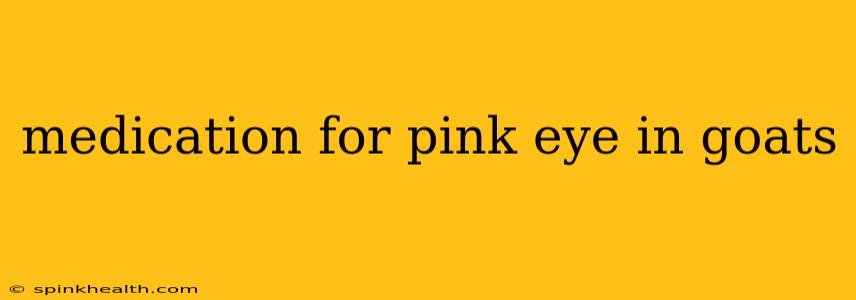Treating Pink Eye in Goats: A Comprehensive Guide
Pink eye, or conjunctivitis, is a common ailment affecting goats, causing discomfort and potentially impacting their overall health. While it often resolves on its own, timely treatment can prevent complications and speed recovery. This guide explores effective medication for pink eye in goats, offering valuable insights for goat owners.
My name is Dr. Evelyn Reed, and I've spent over fifteen years working with livestock, including extensive experience treating goat illnesses. I'm passionate about providing accurate and accessible information to ensure the well-being of these wonderful animals. Let's delve into the world of goat pink eye treatment.
What Causes Pink Eye in Goats?
Before we discuss treatment, understanding the causes is crucial. Pink eye in goats can stem from various factors, including:
- Bacterial infections: These are frequently the culprits behind pink eye outbreaks. Bacteria can spread through contaminated water sources, shared pastures, or direct contact between animals.
- Viral infections: Viruses can also cause pink eye, often manifesting alongside other respiratory illnesses.
- Irritants: Dust, pollen, or other irritants can inflame the eye's conjunctiva, leading to pink eye symptoms.
- Trauma: Injuries to the eye can trigger inflammation and infection.
Recognizing the underlying cause can help determine the most appropriate course of treatment.
What are the Symptoms of Pink Eye in Goats?
Identifying pink eye early is key to effective treatment. Common symptoms include:
- Redness and inflammation of the conjunctiva: The white part of the eye appears red and swollen.
- Excessive tearing: The goat may produce a significant amount of watery or mucous-like discharge.
- Squinting or eye rubbing: The goat may show signs of discomfort, rubbing its eyes or squinting.
- Cloudy or opaque cornea: In severe cases, the cornea (the clear outer layer of the eye) may become cloudy.
- Sensitivity to light: The goat might avoid bright light.
What Medication is Used to Treat Pink Eye in Goats?
The appropriate medication will depend on the underlying cause of the pink eye. It's crucial to consult a veterinarian for accurate diagnosis and treatment recommendations. However, some commonly used treatments include:
- Antibiotic eye ointments or drops: If bacterial infection is suspected, your veterinarian might prescribe antibiotic eye medications to eliminate the bacteria. These are usually applied directly to the affected eye(s). Common examples include tetracycline or erythromycin-based products – but only when prescribed by a veterinarian.
- Anti-inflammatory eye drops: These may be used to reduce inflammation and swelling in the eye.
- Cleaning solutions: Gentle cleaning of the eye with a sterile saline solution can help remove debris and discharge, promoting healing.
Never self-treat your goat. Always seek professional veterinary advice.
Can I Use Human Eye Drops on My Goat?
No, you should absolutely not use human eye drops on your goats. Human medications are formulated for human physiology and may harm your goat. The ingredients and concentrations can be toxic, leading to serious complications. Always consult your veterinarian for appropriate medication.
How Long Does it Take for Pink Eye to Clear Up in Goats?
The duration of treatment and recovery varies depending on the severity of the infection and the chosen treatment. With appropriate veterinary care, most cases resolve within a week or two. However, severe cases may require longer treatment periods. Close monitoring is essential to ensure the infection is clearing up.
What are the Potential Complications of Untreated Pink Eye?
Untreated pink eye can lead to serious complications, including:
- Corneal ulcers: Severe inflammation can damage the cornea, resulting in painful ulcers that can impair vision.
- Blindness: In severe cases, untreated pink eye can lead to permanent vision loss.
- Secondary infections: Untreated bacterial infections can spread, leading to more serious systemic infections.
How Can I Prevent Pink Eye in My Goats?
Preventing pink eye involves good husbandry practices:
- Maintain clean and hygienic living conditions: Regular cleaning of water troughs, feed containers, and living areas can minimize the spread of bacteria and irritants.
- Isolate infected animals: Separate goats with pink eye from the rest of the herd to prevent transmission.
- Provide adequate nutrition: A healthy immune system is vital in preventing and combating infections.
- Regularly inspect your goats' eyes: Early detection of pink eye allows for prompt treatment, reducing the risk of complications.
This information is for educational purposes only and should not be considered a substitute for professional veterinary advice. Always consult your veterinarian for diagnosis and treatment of pink eye in your goats. Early intervention and appropriate veterinary care are crucial for ensuring your goats' eye health and overall well-being.

